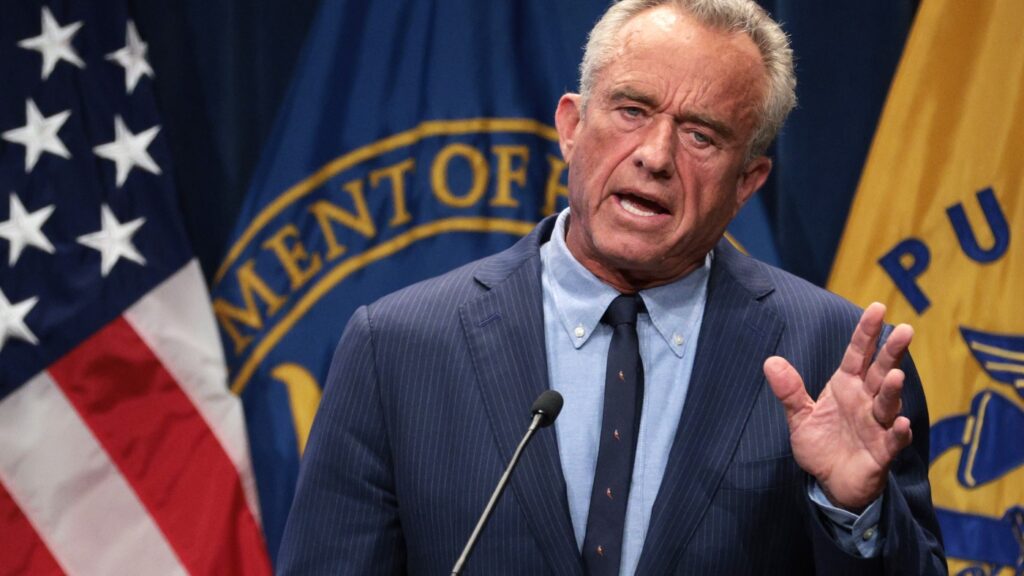
WASHINGTON, DC - APRIL 16: U.S. Secretary of Health and Human Services Robert F. Kennedy Jr. speaks during a news conference at the Department of Health and Human Services on April 16, 2025 in Washington, DC. Secretary Kennedy held a news conference to discuss the recent surge of autism cases. (Photo by Alex Wong/Getty Images)
Health Secretary Robert F. Kennedy Jr. has made a bold move by appointing a new set of advisers to the Centers for Disease Control and Prevention’s vaccine advisory panel. This decision comes just two days after he took the unprecedented step of removing all 17 sitting members. The new appointees will join the Advisory Committee on Immunization Practices (ACIP) at its upcoming meeting in late June.
In a post on X, Kennedy introduced the new members, stating, “All of these individuals are committed to evidence-based medicine, gold-standard science, and common sense. They have each committed to demanding definitive safety and efficacy data before making any new vaccine recommendations.” The newly appointed advisers include Dr. Joseph R. Hibbeln, Martin Kulldorff, Retsef Levi, Dr. Robert Malone, Dr. Cody Meissner, Dr. Michael A. Ross, Dr. James Pagano, and Vicky Pebsworth.
Controversial Appointments and Public Reaction
The announcement has elicited mixed reactions. David Mansdoerfer, a former deputy assistant secretary for the Department of Health and Human Services, praised the move on X, calling it “a huge win for the medical freedom movement.” However, public health advocates have expressed concern. Dorit Reiss, a professor at UC Law, San Francisco, who studies vaccine policy, remarked, “Kennedy did not pick people with strong, current expertise in vaccines. It tells me that Kennedy is setting up a committee that would be skeptical of vaccines, and possibly willing to implement an anti-vaccine agenda.”
The ACIP plays a crucial role in setting vaccine policy and crafting recommendations for the immunization schedule, which guides health providers and influences which shots are covered by health insurers. Kennedy’s selections have backgrounds that are varied, with many gaining prominence during the COVID-19 pandemic for their criticism of government policies on school closures, lockdowns, and mRNA vaccines.
Profiles of the New Appointees
Among the new members, Martin Kulldorff, an epidemiologist and biostatistician, co-authored the Great Barrington Declaration, which questioned lockdowns and other public health measures. Dr. Robert Malone, known for his early work on mRNA technology, has been a vocal critic of the COVID-19 vaccine, making claims that have been widely debunked.
Dr. Cody Meissner, a professor at Dartmouth College’s Geisel School of Medicine, previously served on ACIP and has been critical of certain COVID-19 vaccine recommendations. Vicky Pebsworth has been associated with the National Vaccine Information Center, an advocacy group that warns against vaccine risks. Retsef Levi, from MIT, has also voiced strong criticism of the COVID-19 mRNA vaccination programs.
“COVID mRNA vaccination programs should stop immediately… because they completely fail to fulfill any of their advertised promises regarding efficacy,” Levi stated in early 2023.
Implications and Future Challenges
Kennedy’s decision to overhaul the ACIP has sent shockwaves through the public health and medical communities, raising fears that the new panel may undermine established vaccine policies. The next ACIP meeting is scheduled for June 25-27, but with only eight members appointed, the committee falls short of the quorum required for voting, which is defined as “more than half of the voting members present.”
According to Reiss, at least two ex-officio members from other Health and Human Services agencies will need to be temporarily authorized to vote for the committee to proceed. This procedural hurdle underscores the challenges Kennedy’s new panel faces as it seeks to establish its authority and credibility.
The move represents a significant shift in the CDC’s approach to vaccine policy, with potential implications for public health strategies nationwide. As the new panel prepares to convene, the medical community and the public will be closely watching to see how these changes unfold and what impact they may have on future vaccine recommendations.







